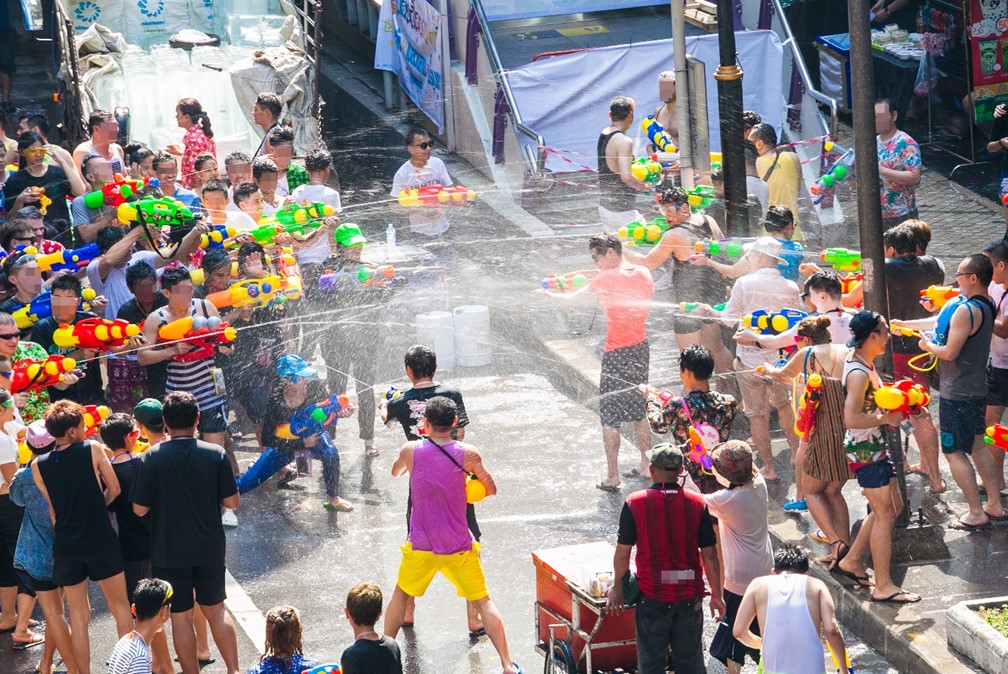Songkran Water Festival (Thailand)
Thai New Year or Songkran is the Thai New Year's national holiday. Songkran is on 9 April every year, but the holiday period extends from 14 to 15 April. In 2018 the Thai cabinet extended the festival nationwide to seven days, 9–16 April, to enable citizens to travel home for the holiday.[1] In 2019, the holiday was observed 9–16 April as 13 April fell on a Saturday.[2] The word "Songkran" comes from the Sanskrit word saṃkrānti, literally "astrological passage", meaning transformation or change. It coincides with the rising of Aries on the astrological chart[4] and with the New Year of many calendars of Southeast and South Asia, in keeping with the Buddhist and Hindu Calendar. The New Year takes place at around the same time as the new year celebrations of many countries in South Asia like Bangladesh, China (Dai people of Yunnan Province), India (Baisakhi in Punjab, Bengal Gajan Utsav, Bengal Charak Utsav, Bengali New Year (Poyla Baisakh/Nababarsha) in West Bengal and Tripura, Bihu in Assam,Gudipadva in Maharashtra, Pana or Mahabisuba Sankranti in Odisha, Tamil Puthaandu (Tamil New Year) in Tamil Naadu, Ugadi in Andhra Pradesh and Karnataka, Vishu in Kerala etc.), Laos, Myanmar, Nepal, and Sri Lanka. In Thailand, New Year is now officially celebrated 1 January. Songkran was the official New Year until 1888, when it was switched to a fixed date of 1 April. Then in 1940, this date was shifted to 1 January. The traditional Thai New Year Songkran was transformed into a national holiday.[5] Celebrations are famous for the public water fights framed as ritual cleansing. Social scientists believe the origin of the festival lies in celebration of spring or harvest in agrarian community as well as religious. In songkran festival, people play with water and thanaka powder is applied on the body. April is a month of very hot sun waves in south east asian countries, to cool body temperature farmers might have enjoyed playing water. Thanaka used in songkran festival because it has several medical properties which protect from skin damage. Later religious myth were associated with the festival. Thus, harvest or spring festival was evolved into a religious festival. Meaning Songkran is a term derived from Sanskrit saṅkrānti meaning 'to move' or 'movement'. It derives from the movement of the sun from one position to another in the zodiac. According to its literal meaning in Sanskrit, a Songkran occurs every month. However, the period that Thai people refer to as Songkran happens when the sun moves from Pisces to Aries in the zodiac. The correct name for this period should actually be Maha Songkran ('great Songkran) because it coincides with the arrival of a New Year. The Songkran festival is, therefore, a celebration of the New Year in accordance with the solar calendar. The celebration covers a period of three days: 13 April is regarded as Maha Songkran, the day that the sun moves into Aries on the zodiac or the last day of the old year. The next day, 14 April is called Wan Nao, the transitional day between the old and the new years, and 15 April is called Wan Thaloeng Sok New Year's day itself.
